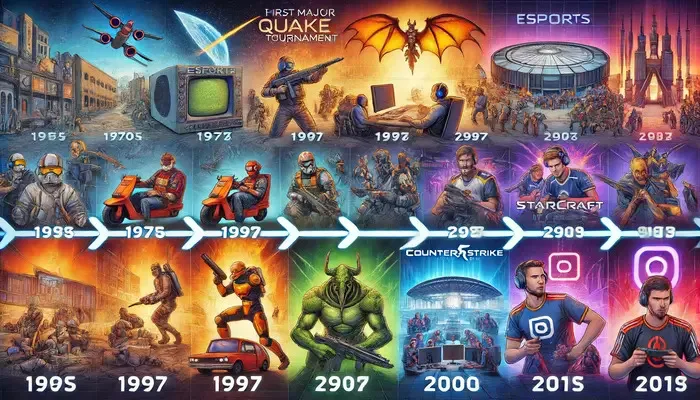
The History and Development of Esports: From the First Tournaments to the Global Industry
Today, esports continues to develop rapidly. The impact of virtual and augmented reality technologies, the growth of investments and sponsorships, and the popularity of mobile games are opening new opportunities for the industry. The integration of esports into traditional sports organizations and the increasing number of university programs for esports are helping to spread it further. For more information about the latest developments, you can check out Platin casino login. In the future, esports is expected to become even more mainstream and diverse, attracting an ever-growing global fanbase.
First Steps: The Birth of Esports
Esports began to take shape in the late 1970s with the advent of the first video games. However, it wasn’t until the early 1990s that it started to gain serious traction. One of the first notable games to host tournaments was Spacewar!, created in 1962. In 1972, Stanford University held the first-ever video game tournament, where students competed for a year’s subscription to Rolling Stone. These early competitions laid the foundation for esports, although it was not yet recognized as mainstream culture.
The 1990s: The Emergence of Organized Competitions
The 1990s were a pivotal time for esports. During this period, organized tournaments and the first professional players emerged. One of the key games that influenced the development of esports was Doom, released in 1993. In 1997, the first major Quake tournament, known as Red Annihilation, took place, where the winner was awarded a Ferrari by the game’s creator. This tournament attracted media attention and became a significant event in the world of esports.

The 2000s: Growing Popularity and International Recognition
From the early 2000s, esports began to actively develop and gain international recognition. Major tournaments like World Cyber Games (WCG) and Electronic Sports World Cup (ESWC) emerged. These competitions gathered players from around the world and offered significant prize pools. Key games of this period included StarCraft, Counter-Strike, and Warcraft III. South Korea became the center of the global esports scene due to the popularity of StarCraft, leading to the creation of professional leagues and teams.
The 2010s: Esports Industry Gains Momentum
The 2010s marked significant growth for the esports industry. Streaming platforms like Twitch allowed players to broadcast their matches and attract millions of viewers. Games like Dota 2, League of Legends, and Counter-Strike: Global Offensive became the foundation for major tournaments with multi-million-dollar prize pools. The creation of franchise leagues such as the Overwatch League and League of Legends Championship Series contributed greatly to the professionalization of esports.
The history of esports showcases its rapid journey from the first tournaments to a global industry with multi-million-dollar turnovers. Continuous technological advancements and a growing audience indicate that esports has a tremendous future and will continue to amaze us with new achievements and events.
Popular articles
-
 The Evolution of Women’s League...
The Evolution of Women’s League...Women’s football in Europe has witnessed an incredible transformation over …
-
 The Biggest Sports Betting Wins of 20...
The Biggest Sports Betting Wins of 20...The year 2025 has already delivered several striking outcomes in …
-
 Which of the top clubs in Europe had ...
Which of the top clubs in Europe had ...January is usually quiet for transfers, but the Premier League’s …
